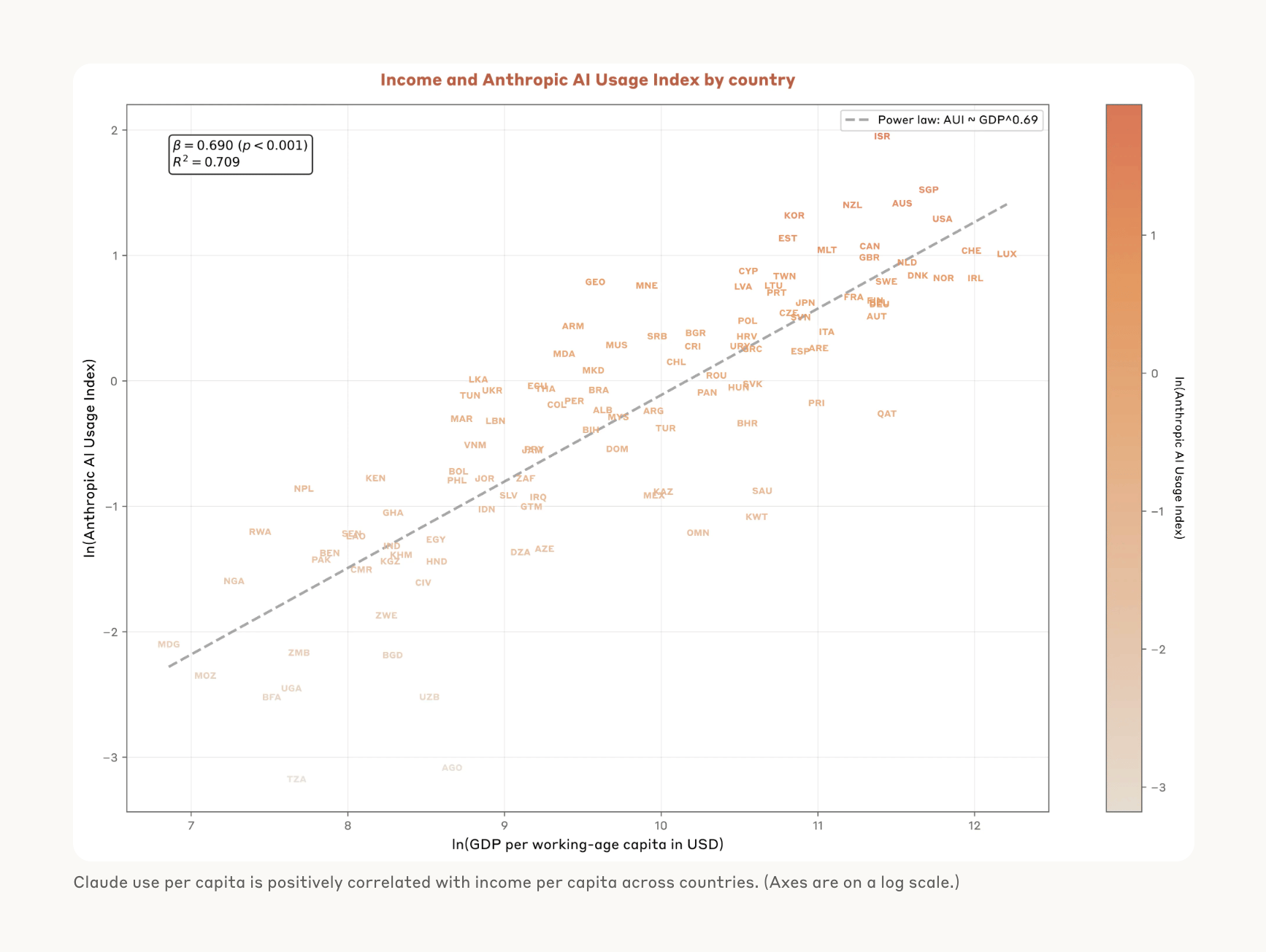
Welcome back AI enthusiasts!
In today’s Daily Report:
🌍AI Usage Is Globally Uneven? The Great AI Divide.
🛒The AI Commerce Revolution Has Begun
🛠Trending Tools
🥪Brief Bites
💰Funding Frontlines
💼Who’s Hiring?
Read Time: 3 minutes
🗞RECENT NEWS
ANTHROPIC
🌍AI Usage Is Globally Uneven? The Great AI Divide.

Image Source: Anthropic!/“Anthropic’s Economic Index: Tracking AI’s role in the U.S. economy and global market landscape.”/Screenshot
Anthropic recently explored how AI is transforming the global economy, raising concerns that AI-driven economic growth may deepen regional inequality.
Key Details:
The U.S. leads global usage of Claude at 21.6%, followed by India at 7.2%, Brazil at 3.7%, Japan at 3.7%, and South Korea at 3.7%.
There’s also a strong positive correlation between GDP Per Capita and AI usage. For instance, a 1% increase in GDP Per Capita is associated with approximately a 0.7% increase in Claude usage.
These findings suggest that wealthier countries are more likely to adopt AI-powered tools because they can heavily invest in digital literacy, enabling citizens to effectively access, understand, and utilize these technologies.
Why It’s Important:
If the productivity gains are larger for high-adoption economies, current AI usage patterns suggest that the benefits of AI advancements will disproportionately accrue to already-rich regions.
This matters because it could possibly further increase worldwide economic inequality, reversing the global growth convergence observed in recent decades.
🩺 PULSE CHECK
Will AI advancements widen the economic gap between rich nations and poor countries?
🛒The AI Commerce Revolution Has Begun

Image Source: Canva’s AI Image Generators/Magic Media
Google just announced “Agent Payments Protocol (AP2),” which enables AI Agents to securely make financial transactions across the internet on your behalf.
Key Details:
For decades, the way we’ve used browsers has followed the same predictable pattern: search, click, skim, repeat. It’s familiar, but it’s also due for an upgrade.
As AI continues to transform how we work, learn, and create, it’s finally reshaping how we browse. We’re no longer just surfing the web. We’re navigating it through AI Agents.
AI Agents are beginning to change how we interact with the internet by acting on our behalf. They can autonomously operate across websites to browse, book, or buy without us lifting a finger.
AP2 uses tamper-proof, cryptographically-signed digital contracts to securely authenticate, validate, and convey an AI Agent’s authority to transact on your behalf.
Why It’s Important:
We’re experiencing a digital shift from asking, “What can I search for?” to “What can my browser do for me?” This evolutionary change signals a move away from manual navigation toward more intelligent delegation.
PROMPT ENGINEERING TIPS
⚙️Make Better Decisions Faster!
When we talk about improving how we make decisions, we usually run into two key challenges:
🔵 Challenge #1: Which inputs actually matter.
🟣 Challenge #2: Which outputs actually drive outcomes.
🔢 The Formula: Smart Inputs + Effective Outputs = Better Decisions
For example, imagine you’re developing a training program to prepare for a marathon. The input would be your current fitness level. Given this input, the output would be a personalized training schedule with tailored resting periods to prevent injuries.
By focusing on the right inputs that yield optimal outputs, you can make informed decisions that drive real results.
This simple prompt turns ChatGPT into your personal decision-making coach:
Context: I want to make clear, confident, and calculated decisions,
Clarity: but I often struggle to identify the key variables and accurately assess the potential risks of my choices.
Guidance: Can you help me analyze {Insert Specific Scenario} to make the most effective decision possible, optimizing for {Insert Primary Goal}?
I want to make clear, confident, and calculated decisions, but I often struggle to identify the key variables and accurately assess the potential risks of my choices. Can you help me analyze {Insert Specific Scenario} to make the most effective decision possible, optimizing for {Insert Primary Goal}?🛠TRENDING TOOLS
🛞Career Steer explores career paths that truly fit you.
📈capix finds and analyzes private companies in minutes.
✨iMini is an all-in-one super AI Agent that understands your needs.
🪧Unshift is a visual website builder that converts designs into code.
🧰 Browse our Always Up-To-Date AI Toolkit.
🥪BRIEF BITES
H Company unveiled “Holo1.5,” which enables AI Agents to navigate your computer screen autonomously to interact with icons and buttons.
Google Research introduced “VaultGemma,” the world’s most capable privacy-preserving LLM that avoids revealing sensitive data when processing inputs.
OpenAI Chairman Bret Taylor said there’s an AI bubble and “a lot of people will lose a lot of money,” but the long-term potential of AI developments is worth the short-term volatility.
Microsoft announced a plan to invest over $30 billion in AI infrastructure within the U.K. by 2028, including the construction of a supercomputer equipped with more than 23,000 NVIDIA GPUs.
💰FUNDING FRONTLINES
CodeRabbit raised a $60M Series B to cut code review time in half.
Microfactory closed a $1.5M Pre-Seed Round for a dog-crate-sized robot factory.
Dyna Robotics landed a $120M Series A for AI-enabled general-purpose robots to power the future of the physical economy.
💼WHO’S HIRING?
Google (Mountain View, CA): Silicon Engineering Intern, Summer 2026
NVIDIA (Austin, TX): Power Optimization Engineer, Entry-Level
Perplexity (San Francisco, CA): Cloud Security Engineer, Mid-Level
.monks (San Diego, CA): AI Solution Director, Senior-Level
📒FINAL NOTE
FEEDBACK
How would you rate today’s email?
❤️TAIP Review of The Day
“Good info on man vs. machine!”
REFER & EARN
🎉Your Friends Learn, You Earn!
{{rp_personalized_text}}
Share your unique referral link: {{rp_refer_url}}
